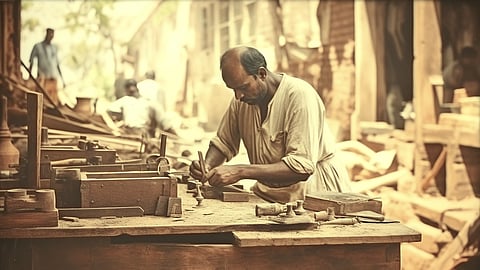- Commentary
- History Vignettes
- Notes on Culture
- Dispatches
- Podcasts
- Indian LanguagesIndian Languages
- Support

This is the first episode of a series featuring an English adaptation of DVG’s lecture delivered at All India Radio on May 10, 1957. The lecture was titled Samskruti (Culture). It is an invaluable and timeless rumination offering original and brilliant insights on a bygone society – our own society. DVG does not omit any facet of this society – the nature of family and relationships, attitudes of people towards work, the basic character of marriage, outlook towards food, and a sort of self-discipline that can’t be taught.
It makes for wistful reading because we no longer have access to that social and cultural milieu.
Happy reading!
CULTURE IS THE ELEGANCE OF BEAUTY found in human relationships. It is the amalgamated resplendence of one’s own nature and that of others. The root of culture is found in our Inner Lives. It is our intrinsic treasure. Its abode is our mind and heart. That which is separate from this abode is our external or worldly life. These are concrete things like house, vehicle, jewellery and money.
In the last fifty years, our country has progressed quite impressively with respect to these external conveniences. Even in the recent past, motor vehicles and airplanes weren’t as common as they are now. Likewise, schools, hospitals, trains, banks, factories and businesses were not as ubiquitous. We have witnessed growth in this external wealth.
However, we have not grown proportionately in our Inner Wealth during the same period. In my opinion, we have only grown poorer. My purpose in this lecture is to offer five or six instances that demonstrate this Inner poverty.
First, machines are occupying the place of humans. We are cultivating a practice whereby machines are doing the work that should be performed by the human heart. Fifty years ago, wedding invitations were handwritten. Now they are printed. During the process of writing by hand, the mind would contemplate on the stature of each recipient and offer the appropriate affection and respect. This is what is known in English as the “personal touch”—in the real sense. That is no longer the case now; the printed invitation card akin to newspapers, reaches a thousand people. It does not need the wisdom of propriety.
In the past, when guests and well-wishers visited home, the host would offer homemade snacks. Now we buy stuff from hotels. Else, we take the guests to hotels. It may be true that hotel food is tastier. But will it contain the same heartfelt love and affection of family members who actually prepare the food with their own hands?
In the past, if there was a pregnant woman in the home, family members would prepare Chakkuli for her by weaving its circular folds by hand. Nowadays, it is rare to see these circular beauties. What used to be prepared by fingers is now being prepared by mortars. The heart operated behind the fingers. There is no intimate relationship between the mortar and the heart.
When the bridegroom sat on the wedding dais, young women would sing, motivated by a sense of pride in their melodic voices, and old women would sing from the enthusiasm of affection. Today’s music is the gramophone.
The fragrance of those days emanated from a heady mix of sandalwood paste mixed with saffron and camphor, ground by hand. Today, it is “scent.” Artifice has replaced nature.
Let’s consider another vital aspect. In these last fifty years, our people have lost pride in workmanship. In the past, people had deep respect towards their daily chores – the man in his profession, the woman in her culinary skill and household work. The farmer displayed justified ego in wielding his plough, driving his oxen and in his farming prowess. The carpenter and the mason showed tremendous esteem in the magic in their fingers. The accountant was proud of his elegant calligraphy, the Purohita took pride in the melodic accuracy of his mantra, the schoolteacher in the purity of his teaching, and the potter beamed with joy at the suppleness of his hands.
In those days, the feeling that work must be done solely for the sake of wages was not prevalent. It is not that they did not need money for their work. Some of these professionals were poor. However, they had not learnt the habit of deliberate deception by using their profession as the means. Their mind would not accept even the notion of cutting corners while carrying out professional duties. The conviction of the people of that era was that the food that they ate without doing their work honestly would not digest. This was an article of faith and discipline among them: just as how nature discharges her duty, we too must perform our duty with as much skill and beauty as possible. Working in an unseemly hurry, cutting corners, displaying an outward pretence of hard work, and trying to extract maximum money for minimal effort—these attitudes were unknown back then.
Of late, new businesses and professions have sprung up and have instilled a mentality of leading a crafty life. The ways of the urban life, hypocrisy, and easy access to deceptive advertising have enfeebled genuine integrity and encouraged guile and duplicitous methods. In this manner, even the minimum qualification for work is being eroded in our people at an alarming pace. There is no greater loss for a society than the loss of workmanship.
To be continued
The Dharma Dispatch is now available on Telegram! For original and insightful narratives on Indian Culture and History, subscribe to us on Telegram.
